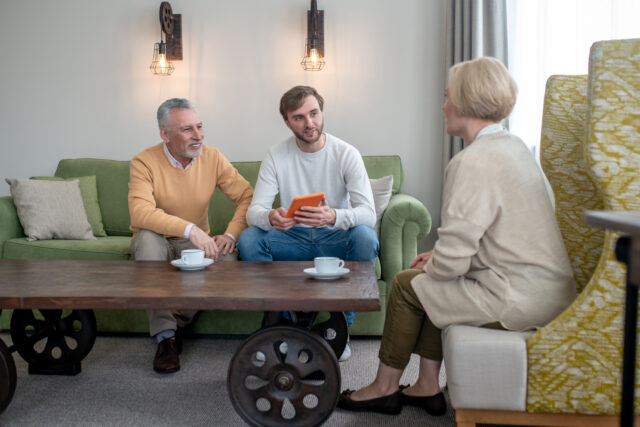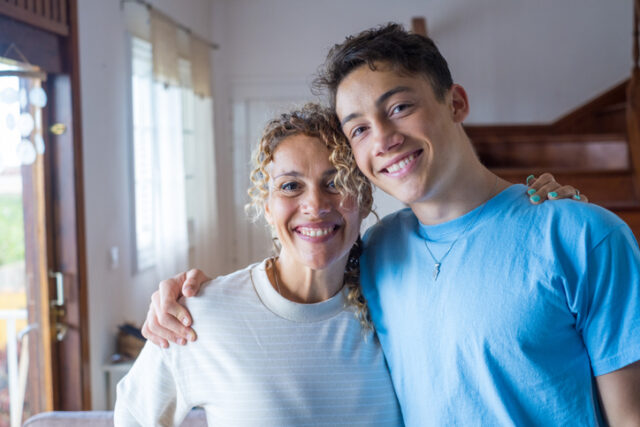There’s a weird but beautiful change that happens when your relationship with your parents moves beyond just parent-child roles and into actual friendship.

Suddenly, you’re not just following rules or playing family parts—you’re genuinely hanging out, learning from each other, and sometimes even leaning on each other like equals. If you’ve reached that space with your parents, these little moments and feelings will probably hit home in a way not everyone gets. Consider yourself lucky, as this is truly a special dynamic.
1. You start having real conversations, not just updates.

It’s not just “How was work?” and “Did you eat?” anymore. You start talking about real stuff—ideas, regrets, dreams, funny observations—like you would with any good friend. You actually want their opinion, not just out of duty, but because you respect how they see the world.
When the conversations feel natural instead of obligatory, you realise you’re building something deeper than just family ties. You’re building an actual friendship, and it feels good to see each other in a new light.
2. You share things with them that you used to hide.

As a kid or teenager, your instinct might’ve been to hide anything messy, complicated, or less-than-perfect. Now? You’re more willing to share your bad days, your doubts, your mistakes—because you know they won’t weaponise it or judge you for it. Being able to be messy in front of your parents without fear of losing their respect is a whole different kind of bond. It’s the comfort of knowing you’re accepted even when you’re not at your best.
3. You start teasing each other like friends do.

There’s a special kind of banter that only comes when the old parent-child power dynamic fades. You can tease them about their stubbornness, their odd little habits, or their bad jokes, and they tease you right back. It’s not disrespectful, it’s affectionate. It’s the kind of back-and-forth that says, “I see you, flaws and all, and I love you even more for it.” It makes everything feel lighter between you.
4. You ask for their advice because you actually value it.

There’s a difference between being forced to listen to advice and genuinely wanting to hear it. When you hit that friend level with your parents, you actually ask for their thoughts—not because you have to, but because you know they’ve lived enough life to have something valuable to offer. Even if you don’t always take the advice, you appreciate that it’s coming from a place of real care. And sometimes, they surprise you with wisdom you never would’ve expected when you were younger.
5. You see their humanity more clearly.

Parents stop being these towering figures of authority and start becoming real people with insecurities, regrets, weird quirks, and soft spots. You see the choices they made differently—not always perfectly, but often with more compassion than you ever realised before. Recognising their humanness makes forgiveness easier and admiration deeper. They didn’t always get it right, but neither do you. Somehow, knowing that makes the bond even stronger.
6. You don’t expect them to “parent” you in every situation.

There’s a shift where you stop expecting them to fix everything or guide every decision. Instead, you talk things through together like equals, knowing they’ll offer support but also trust you to figure things out. It’s a subtle but important change. You don’t need them to save you anymore; you just appreciate that they’re still walking beside you while you save yourself.
7. You laugh at how much you’re alike (and different).

You start seeing the weird little ways you’ve turned into them, and the ways you’ve wildly diverged, and you can laugh about it together instead of feeling defensive about it. It’s a kind of mutual appreciation: they see themselves in you, you see their influence on your life, and you both find the humour in how beautifully inevitable some of it is.
8. You’re genuinely curious about their stories.

At some point, their stories stop feeling like lectures or boring re-runs. You want to hear about their wild twenties, their bad decisions, the dreams they had before they became “mum” or “dad.” Listening to their past isn’t just about gathering facts. It’s about understanding who they really are beyond the role they played in your life. It deepens the friendship because you’re not just seeing the parent—you’re seeing the person.
9. You can disagree without it turning into a meltdown.

When you’re stuck in a strict parent-child dynamic, disagreements can feel explosive or deeply personal. But when you become friends, you can disagree—sometimes even passionately—and still respect each other afterward. You don’t need them to agree with every choice you make. You just need to know that even when you see things differently, the respect and affection are still there underneath it all.
10. You enjoy doing nothing together.

It’s not about planning big events or forcing bonding activities. Sometimes it’s just about sitting in the same room, reading separate books, watching rubbish TV, or having random conversations that go nowhere in particular. Being able to enjoy each other’s company without pressure or performance is real friendship. It’s knowing that their presence is comforting, even when there’s nothing exciting happening.
11. You share similar complaints about life now.

You might find yourselves bonding over how annoying certain trends are, how expensive everything has become, or how ridiculous adulting can be. It’s funny—and a little surreal—when you start nodding along to their rants instead of rolling your eyes. It’s a reminder that you’re both just trying to navigate life the best you can. And sometimes, venting together becomes a weird but wonderful form of connection you never saw coming.
12. You want to introduce them to your world.

You’re not embarrassed to bring them into your life anymore. Whether it’s inviting them to your favourite coffee shop, showing them a show you love, or introducing them to your friends, you genuinely want them to be part of it. It’s not obligation—it’s wilful inclusion. You want them to know you not just as their kid, but as the full person you’ve become.
13. You respect their boundaries more.

Friendship means recognising that they have their own limits, moods, and needs too. You don’t push them to talk about things they’re uncomfortable with, and you don’t expect them to drop everything just because you called. It’s about giving them the same grace you give your other friends, and realising that respect doesn’t have to be formal or stiff to be deeply meaningful.
14. You appreciate how much they’ve evolved, too.

It’s easy to think of parents as stuck in their ways, but when you become friends, you start noticing the ways they’ve grown too. Maybe they’re more open-minded, more playful, or more willing to apologise than they were years ago. Seeing that growth reminds you that change doesn’t stop at any age—and that friendship, like any relationship, thrives when both people keep evolving together.
15. You realise that love can change shape, and still be just as strong.

The love between you doesn’t look the same as it did when you were little. It’s less about caretaking and more about showing up for each other in real, everyday ways. It’s quieter, maybe, but deeper too. Realising that love can grow with you—that it can survive awkward stages, arguments, and growing pains—is one of the greatest gifts of turning a parent into a friend. It’s love with roots that go all the way down.




